Doing the honourable thing by accepting responsibility for mistakes within the criminal justice system stands out as a novelty, it sometimes seems to us. So we want to recognise some of those who have done the honourable thing, apologising for mistakes and/or malpractice that sent people to prison. That’s a start – but The System must reduce the need to apologise. Reforms to The System would help, but The System is not reforming itself.
Apologies for wrongful convictions are valuable. “In a variety of contexts, the offering of an apology to victims for past wrongdoings has been critical to their healing. Like the wrongfully convicted, many groups have suffered wrongful detention, abuse, or other offenses at the hands of a large group whether it is a government, a religious or medical institution, or some other organization.” So argues an attorney at Bear Sterns, Abigail Penzell, in her paper “Apology in the context of wrongful conviction: why the system should say it’s sorry”
“When evidence proves that a wrongfully convicted individual is actually innocent, state actors have a choice of whether to apologize or not. An apology has the capacity to aid victims as well as the state actors themselves, to improve the system through a recognition of its flaws, and to give the community the security of knowing that the state’s commitment to justice will ensure that the right people are imprisoned and that the innocent are free.” Optimistic but valid …
Here are a few Honourables we found who represent The System.
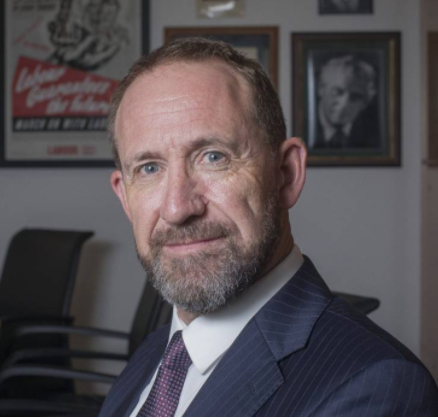
NZ Justice Minister Andrew Little
The Honourable NZ Justice Minister Andrew Little
New Zealand Justice Minister Andrew Little says he decided to offer a personal apology to a wrongfully convicted man after he read about his traumatic experience of prison.
The Government will pay Tyson Redman $551,000 in compensation for his assault conviction and imprisonment for two and a half years. The compensation included a written apology. But Little said he decided to take the unusual step of ringing Redman himself to apologise.
“I was aware from [QC] Donald Stevens’ report that Tyson’s time in prison for something he clearly didn’t do was traumatic and I was pleased to be able to say I hope he could put these events behind him and build a good life for himself.”
Little also said that he felt his response to a previous wrongful conviction case, that of Teina Pora, had been too impersonal. Pora received $3.5m in November for his 20 years in jail on wrongful rape and murder charges.
Redman was convicted in 2007, aged 17, in relation to a group assault at a 21st birthday party in Mt Roskill. His conviction was not quashed until 2013 – long after he had served a full prison sentence – when it was proven that he was not at the party at the time.
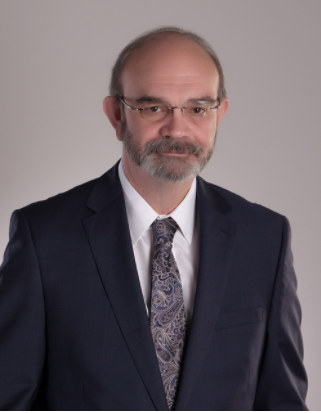
Marty Stroud III
The Honourable attorney A.M. “Marty” Stroud III
SHREVEPORT, La. — Saying the words “I apologize” seems so inadequate at times. And this is one of them for attorney A.M. “Marty” Stroud III.
But he feels it must be said to Glenn Ford, the man who spent almost 30 years behind bars for a murder he didn’t commit.
Stroud, 63, was the lead prosecutor in Ford’s 1984 murder trial. Even though it was a jury of 12 people who unanimously voted to convict Ford of the Nov. 5, 1983, shooting death of Shreveport, La., jeweller Isadore Rozeman then chose the death penalty as his punishment, Stroud takes responsibility for the decision — one he now admits was flawed with inaction on his part and coupled with the admitted “arrogant, judgmental, narcissistic and very full of myself” attitude of the attorney he was then.
In perhaps an unprecedented move by a former prosecutor, Stroud is offering a public apology to Ford in a three-page letter to The (Shreveport, La.) Times in response to the newspaper’s coverage of Ford’s plight.
He doesn’t stop there. Stroud takes the state to task for fighting Ford’s effort to gain compensation for his wrongful incarceration. And he calls for the abolishment of the “barbaric” death penalty — a stance he says changed over his 38 years as an attorney, but even more so now realizing his role in asking a jury to consider putting to death a man innocent of a crime.
“I’m relieved because he was released from death row and did not get the death penalty,” Stroud said. “On the other hand, I’m shocked and devastated that I had, albeit unwillingly, sent a man to a hell hole who had no business being there in the first place.”
It’s too easy to take the position of “Oh, I didn’t know,” he said. But when a person’s life is at stake, an “attitude like that doesn’t cut it.”
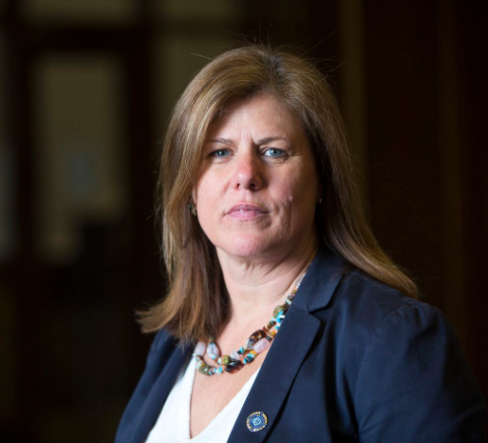
Patricia Cummings
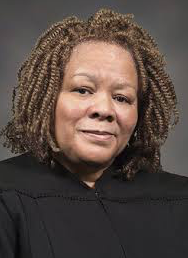
Judge Gwendolyn N. Bright
The Honourable ADA Patricia Cummings & Judge Gwendolyn N. Bright
Chester Hollman spent 28 years behind bars, knowing every single day that he served that he is innocent.
“We believe it was near-impossible Chester Hollman was the perpetrator of the crime,” Assistant District Attorney Patricia Cummings, head of the Conviction Integrity Unit, said in court, according to the newspaper.
“I apologize to Chester Hollman,” Cumming said. “I apologize because he was failed, and in failing him, we failed the victim, and we failed the community of the city of Philadelphia.”
She wasn’t the only one to apologize on behalf of a major institution, as the judge who oversaw Tuesday’s motion hearing to dismiss the charges against Hollman also apologized on behalf of the court.
“This is one of those bittersweet moments where [there is] joy in the fact that justice has been served, but sadness in the fact that it has taken so long,” said Common Pleas Court Judge Gwendolyn N. Bright, according to The Inquirer.
The Honourable judge Steven L. Barrett
Huwe Burton served nearly 20 years in prison before being paroled in 2009.
Judge, Steven L. Barrett, ruled after lawyers for the Innocence Project and the Bronx district attorney’s office brought forward new evidence that suggested someone else killed Ms. Burton, and that detectives had used psychologically coercive interrogation techniques to get Mr. Burton to give a false confession.
Justice Barrett expressed remorse. “Certainly it is a tragedy that Mr. Burton spent some 20 years in jail for a crime he did not commit,” Justice Barrett said. “For this I apologize on behalf of a system that failed him.”
Justice Barrett said he had presided over another homicide case in 1988 in which the same detectives who had elicited a false confession from Mr. Burton had coerced phony statements from two men, who implicated a third man in the murder. It later came out the third man was in jail at the time of the killing and could not have been involved.
Justice Barrett said he dismissed the idea at the time that the confessions were erroneous. The case went to trial and a jury acquitted the men in an hour. He acknowledged his mistake in that case, and apologized for what Mr. Burton had experienced.
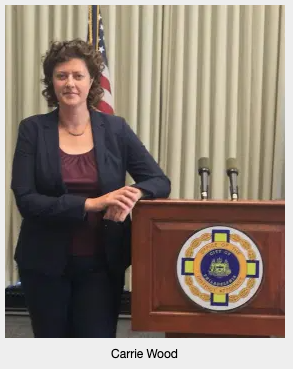 The Honourable prosecutor Carrie Wood
The Honourable prosecutor Carrie Wood
A man who spent nearly three decades behind bars, most of them on death row, after he was convicted at his second trial of killing a 4-year-old girl in Philadelphia, was released after prosecutors concluded he very likely did not do it.
Walter Ogrod left death row and the State Correctional Institution-Phoenix hours after his charges were reduced and he was granted bail in the 1988 death of Barbara Jean Horn.
His lawyer, James Rollins, said Ogrod’s first stop would be a relative’s backyard barbecue. “He was very pleased and relieved to be out of prison,“ Rollins said. “He is very tired.”
A prosecutor apologized to Ogrod, who still faces a small chance of a third trial.
“I’m sorry it took 28 years for us to listen to what Barbara Jean was trying to tell us: that you are innocent, and that the words of your statement of confession came from Philadelphia Police detectives and not you,” told Ogrod, according to a news release from Wood’s office.
Ogrod’s lawyers say police coerced a false confession from him in the death of Barbara Jean, who his defense lawyers say may have died of asphyxiation and not blows to the head, as prosecutors argued at trial.
Sources:
NZ Herald / USA Today / ABC News (US) / The New York Times / The Spokesman Review
FOOTNOTE: We have tried but not found any instance of similar examples of apologies in Australia; readers are welcome to point us to any that exist.
* Over zealous police conduct (not to mention illegal behaviour) is recognised as a major contributing factor in leading to miscarriages of justice. This reflects badly on the good cops so one would think there would be support for reforms from them. The first step would be to ensure existing procedural rules and guidelines are followed.
* Forensic experts should be viewed and heard with caution by juries and judges. Prosecutors should ensure that their experts are qualified to give evidence in their field and deliver accurate, independent and accessible evidence.
* Prosecutors impermissibly pursuing convictions irrespective of the facts are a disgrace to the profession and a menace to the interests of justice – they should be hounded out. Those found to have broken the rules should face severe consequences.
* Defence lawyers must ensure they diligently present all exculpatory evidence to the court.
* Judges must be more alert to prosecutorial misconduct and use wisdom and caution in directions to juries. They must not resist criticisms of other lawyers and judges nor allow such criticisms to influence their judgements.
WHAT HAVE THEY DONE TO HELP INTRODUCE REFORMS OF THE SYSTEM?
The Australian Law Reform Commission is an independent Australian Government agency that provides recommendations for law reform to Government on issues referred to it by the Attorney-General of Australia.
Law societies & institutes around Australia have a regulatory role including the right to supervise the training, qualifications and conduct of lawyers.
The Law Enforcement Conduct Commission was established in 2017 as a permanent independent investigative commission to provide oversight of the NSW Police Force and NSW Crime Commission.
The Tasmanian Integrity Commission is tasked with preventing and investigating public sector misconduct. For one example of its failure to execute this task, see our report in which the Commission sought to argue that a police officer’s public statement that is contrary to the facts is not in breach of the Integrity Commission Act.

Speaking of AGs, I just this week received a reply from Office of Elise Archer, Attorney General, Minister for Justice and Minister for Corrections, amongst other of her portfolios.
People often are critical of the fact that Sue is not allowed bail while her second appeal is being delayed again and again. It is now five years (Dec? 2015) since Susan Neill-Fraser filed an application seeking leave to lodge a second appeal under the then new amendment to the Criminal Code Act 1924. This allows second and further appeals against a conviction when fresh and compelling evidence comes to light.
However the law as it stands does not allow for bail prior to the hearing of this second appeal. To remedy this, I drafted an amendment to the Criminal Code and asked the Attorney General to introduce such an amendment into the Parliament:
SUGGESTED AMENDMENT:
That s415 of the Criminal Code Act 1924 be amended by inserting in sub section (6) [the words] “or section 402A(2)” after [the words] “section 387”.
This suggested change would amend the bail provisions in the Criminal Code to allow for bail for those who have been granted leave to make a second or subsequent appeal under section 402A of that Act.
Section 415 of the Act presently provides for bail while-at-appeal on questions of law (s387). The amendment that I propose would also provide for bail while-at-second-or-further-appeal, thus:
415. Admission of appellant to bail and custody when attending court
[…]
(6) This section shall apply to a person in respect of whose conviction a case has been stated under the provisions of section 387 or section 402A(2).
RESPONSE
The Minister has replied …
“[…] At this time, the Government has no intention to pursue an amendment to allow an application for bail by a person awaiting the hearing of an appeal under section 402A. […]”
FIVE YEARS
Five years since asking for a second appeal. Now the appeal almost hopelessly delayed by the virus. Supposedly it will now take place in November … but you wouldn’t bet the rent on it, would you? And when – if the appeal is ever heard and if it succeeds – will there be apologies from Chief Justice Blow, from former DPP Ellis and DPP Coates, from former Detective Inspector Powell, from Coroner Hay, from former Premier Will Hodgman, former Acting Attorney-General Groom and Solicitor-General O’Farrell? And will there be an apology from the present Attorney-General, Elise Archer?
None of those you mention will appear on a list of Australians in the criminal justice system who we regard as Honourable…see this article above.
Cowards and delusional charlatans come in many forms. Many are just basically unskilled and uneducated, and have no real formative structures to their so called careers, apart from some pitiful form of recognised in house promotions, along with an obsequious outlook, that is confirmed by the culture that “may the next rung on the ladder be my rudder”. Injustice has long been fought against by those who transparently wear their hearts on their sleeves, not glory hunting, capitulating, ex criminal lawyers, public servants, and others still seeking the long lost desire for recognition, of their supposed now newly acquired, superb skills. Credibility is the key factor that will eventually unleash the shackles that harness Sue Neill Fraser to the neo colonial judicial system in Tasmania I have long believed, and I sincerely hope that the real credibility/honesty of those claiming to be her supporters, and allies, is not breached, and can also be upheld when the close scrutiny begins.
What did you actually say Robert. What did you accuse me of?
Did you miss the use of a ; before capitulating which changes the context which I can accept. Otherwise I do not understand what you have said.
When the Royal Commission takes place, I will be there giving evidence about the justice system and corruption.
Bring it on.
We do not hear enough of or from Colin McLaren in all this travesty. His actual participation with Eve Ash in the UNDERCURRENT series still is salutary and an unforgettable experience in my view. The one thing I will never forget is the police officers impounding their equipment and records of their research into this sordid affair of Susan Neill-Fraser’s incarceration. It is hard to imagine such crude behaviour in our Australian society. Nazi Germany, Stalinist Russia or the Anti-American Activities Committee OK but not here in sunny diplomatic laid-back Australia.
One word that Colin uses and I may have used myself is “win”. We do place emphasis on our sporting activities to the extent that the desire to win only indicates a failure to grow up to adulthood. It is a facet of refusal to accept responsibility.
A Frankestein monster has evolved in the quiet backwater of Hobart, Tasmania and they can’t control it at all.
Search but you wont find any public apologies from Attorneys General, Police Commissioners or DPPs.
We seem to be a nation too obsessed with our own public profiles to say ‘sorry’ for any public wrong doing. The current Federal Attorney General has first-hand experience with a wrongful conviction, that of Andrew Mallard in Perth – who served 12 years for a murder that a non-acquaintance committed – and the AG signed his freedom papers. Yet he stays shy of the current spate of controversial convictions that scream ‘wrongful conviction’. Why? It can’t just be because of Constitutional borders. Anyone with a conscience and passion for social justice can see that the case of Sue Neill-Fraser needs intervention on any level.
It’s telling that the apologies you write about are all non-Australian and many of them from women in judicial power. For, from my experience, women are more compassionate in these matters, whereas – as I saw in my long detective career – men are often overly focused on a ‘win’, hence their avoidance to disclose exculpatory evidence that might see an accused acquitted. The root cause of a great many wrongful convictions.
Australia is so far behind the rest of the world in setting up a CCRC. And finding AGs that are brave enough to embrace the concept. As for apologies, well ……..
God Bless You Colin, and Eve; and all supporters for true justice, and the victims and their families. You all are helping me cope on the outside, but let me say this;
Tasmania is a prison for the poverty stricken and unemployed and hard done by typical working class; unless you are connected; either way; and that’s the way it is. I have proof, sad as it is. Truth is truth.
So what does that say about the Leaders of the Community.
A victim has 3 choices. Self destruct. Negative. Destruct. Negative.
Or refuse to give up to grow. Positive.
I was hanging on to threads way before the worst; not even police intimidation was crippling me. It ruined my career in 6 months. And the intimidation and fear the attempted to inflict.
Whistleblowers Tasmania will be have so many cases it blows my mind.
But Never Give Up.
JESUS LIVES.